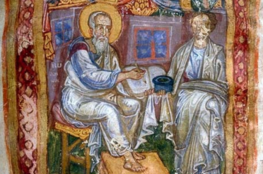Matthew Schmitz, over at First Things, has a thoughtful piece up concerning the limits of papal celebrity. It indirectly reminded me of this October 3, 1979 entry from Fr. Alexander Schmemann’s journals, which is one of my favorites.
The Pope of Rome [John Paul II] is in New York. We watched him on television in Yankee Stadium. A mixed impression. On one hand, an unquestionably good man and full of light. Wonderful smile. Very genuine — a man of God. But, on the other hand, there are some “buts”! First of all, the Mass itself. The first impression is how liturgically impoverished the Catholic Church has become. In 1965, I watched the service performed by Pope Paul VI in the same Yankee Stadium. Despite everything, it was the presence, the appearance on earth of the eternal, the “super earthly.” Whereas yesterday I had the feeling that the main thing was the “message.”
This message is, again and again, “peace and justice,” “human family,” “social work,” etc. An opportunity was given, a fantastic chance to tell millions and millions of people about God, to reveal to them that more than anything else they need God! But here, on the contrary, the whole goal, it seemed, consisted in proving that the Church also can speak the jargon of the United Nations. All the symbols point the same way: the reading of the Scriptures by some lay people with bright ties, etc. And a horrible translation: I never suspected that a translation could be a heresy: Grace — “abiding love”!
Crowds — their joy and excitement. Quite genuine, but at the same time, it is clear that there is an element of mass psychosis. “Peoples’ Pope . . .” What does this really mean? I don’t know. I am not sure. Does one have to serve Mass in Yankee Stadium? But if it’s possible and needed, shouldn’t the Mass be, so to say, “super-earthly,” separated from the secular world, in order to show in the world — the Kingdom of God?




September 22, 2015
Yes, unfortunately, the Roman Catholic Church appears to be becoming more and more nothing more than a personality cult. It is very sad. But what is even sadder is that most Catholics, at least the ones I know, do not seem to have a problem with any of this.
September 22, 2015
I think the advent of the Celebrity Pope with John Paul II (though Paul VI had some elements of this too) really redefined the papacy in a way Catholics have not fully come to grips with. It has brought about, among other things, a de facto doctrinal shift where the pope is no longer the Vicar of Christ, but the Oracle of God. Benedict XVI was right to warn the faithful of this. Too bad they didn’t listen.
September 22, 2015
ISTM that the first “Celebrity Pope” was John XXIII. He wasn’t the globe-trotter that JP II was, and there was no “Popemobile,” but he was widely admired (by Catholics and non-Catholics alike) because he was perceived as a uniquely liberal and open-minded Pope. Remember that while Paul VI presided over Vatican II and over its lamentable implementation, it was John XXIII who convoked the council and explicitly stated that its purpose was to “open the windows” of the Church to the modern world:
The ecumenical council will reach out and embrace under the widespread wings of the Catholic Church the entire heredity of Our Lord Jesus Christ. Its principal task will be concerned with the condition and modernization (in Italian: aggiornamento) of the Church after 20 centuries of life.
This idea of “modernizing the Church” made “Good Pope John” wildly popular. The idea has not, perhaps, worked out all that well.
September 23, 2015
Nope, the papolotry got into high gear starting with Pio Nono and Leo XIII, and never slowed down throughout the 20th century. You can’t say Pius XII was not a practiced master of mass communication, and all John XXIII did was step into the fully built out machinery that Pius XII had put into place since his days as rising star going back to Piux X.
Pius XXII was the true modernizer and lodestar for the progressives in the Church. He touched everything of importance in the 20th century, perhaps most importantly the Napoleonic Code of Canon Law of 1918, which gave legal structure and ability to implement the immediate, supreme and universal jurisdiction claims of Pastor Aeternus.
So don’t blame John, or Paul or Ringo (oops, I meant Bugnini). Blame Pius XII if you’re going to place blame where it belongs.
September 22, 2015
Some of us did listen.
September 25, 2015
The haste to canonize JPII and John XXIII struck me as somewhat unseemly. We’ll know the Church has really jumped the shark when Benedict XI and Francis are designated feast days antemortem.
Is there anything to the claim that Italian unification and the loss of the Papal States was the driving force behind Pastor Aeternus? I know RC apologists attempt to minimize the rather maximal authorities flowing from VI. Maybe the fact that JPII didn’t hammer his subordinate bishops over the sex abuse matters supports that position of self-imposed, papal restraint. However, it is my understanding that defrocking had to be referred to the Curia, which frustrated diocesan bishops trying to protect their flocks. I guess subsidiarity only applies to the secular world.
When Rome sneezes, dioceses worldwide catch a cold. I don’t think anyone can justifiably argue that the term “Roman Catholic Church” is in any sense a pejorative anymore given the scope of Rome’s jurisdiction and how it has been exercised since VI. Rather, RCC accurately describes the current ecclesial structure of the Church and the Catholic brand. McDonalds franchisees have more autonomy than a RC bishop. A manager can actually fire a cashier for stealing from the till without having to get approval from corporate HQ, unlike a bishop handling a child abuser. It’s even worse situation when a weak pope allows the Curia to run amok, e.g., the sainted popes noted above, one who was alternatively either too busy jet-setting to end Communism or physically deteriorating.
Too bad the same liberal forces that drove Pius IX nuts also toppled the Austrian Emperor, who could, although understandably disputed by Pius IX, among other popes, exercise a check on the papacy by veto over papal candidates.
I hope a future pope can unpaint the Church out of the Pastor Aeternus corner. I also hope such a gesture would improve relations with the Orthodox. We need you Orthodox more than you need us. I don’t blame some Orthodox for treating the RCC like a plague ship.
I do like how Benedict gave his bishops some liturgical freedom to use more traditional forms even if Sum. Pont. was arguably ultra vires as the ’62 mass, another top-down product, was abrogated by a predecessor.
Sorry for the disquisition. Love your blog!